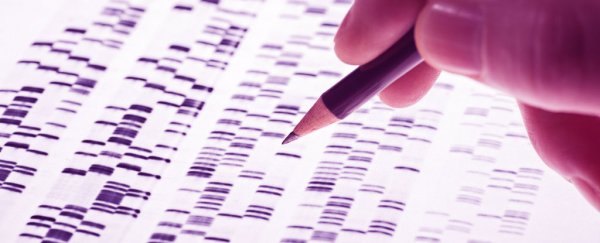Scientists have spotted new links between certain gene mutations in the body and the risk of developing cancer, even in genes only loosely associated with the disease.
They found that the more genetic variations you carry, the earlier you're likely to develop some forms of cancer, and that knowledge could one day help doctors diagnose cancers in advance, and provide more effective treatments earlier.
"This is the first time – in any cancer – that anyone has quantified the effect of multiple rare genetic mutations on cancer risk," explained lead researcher David Thomas from the Garvan Institute of Medical Research in Australia.
While scientists know that genetics affect cancer risk, we're still only beginning to understand the complexities of how it works.
Mutations in certain genes, like BRCA1 and BRCA2, are known to be linked to the development of certain types of cancer, but this time, the researchers looked at a broader range of mutations.
A total of 1,162 patients suffering from sarcoma – cancers of the bone and tissue – were included in the study, which discovered that numerous mutations in 'low-risk' genes can still add up to significantly increase a person's chance of developing the disease.
The researchers found that those who had mutations in two genes were substantially more at risk than those who had just one. And the risk factor increased again with mutations in three genes.
"Until now, we've been limited to single-gene thinking," said Thomas. "So we tell patients, for instance, that carrying a BRCA1 mutation means their breast cancer risk is higher, or that their risk of sarcoma and other cancers is higher if they've got a particular mutation in the p53 gene."
"The study shows us that the landscape of cancer risk is far more complex than that," he added. "We can now see that the risk for developing sarcoma is increased through the combined effect of multiple genes, and that the more mutations someone carries, the earlier the onset of cancer."
"In addition to TP53, ATM, ATR, and BRCA2, an unexpected excess of functionally pathogenic variants was seen in ERCC2," the authors write in The Lancet Oncology. Defects in these genes significantly increase the risk of developing sarcoma.
The study suggests that sarcoma is one of a select group of cancers – like breast and bowel cancer – where our susceptibility is influenced by the genes we inherit from our parents. But it also means that it should be easier to spot high-risk cases sooner, and get the right treatments ready.
If replicated in further studies, the findings could give medical experts a new set of genes to scan for - including those that were previously thought to be low-risk - and a reason to look out for combinations of mutations that could have a cumulative effect on a patient's risk of developing cancer.
Familial histories of cancer will also give researchers a head-start in identifying which patients might have health problems in the future.
"We've never been able to identify these at-risk individuals, and their families, before," said Thomas. "Now we can. That means we can manage risk better, and help those people to get the care they need, when they need it."
